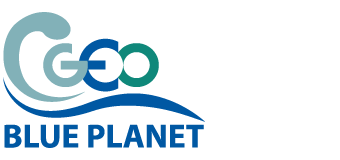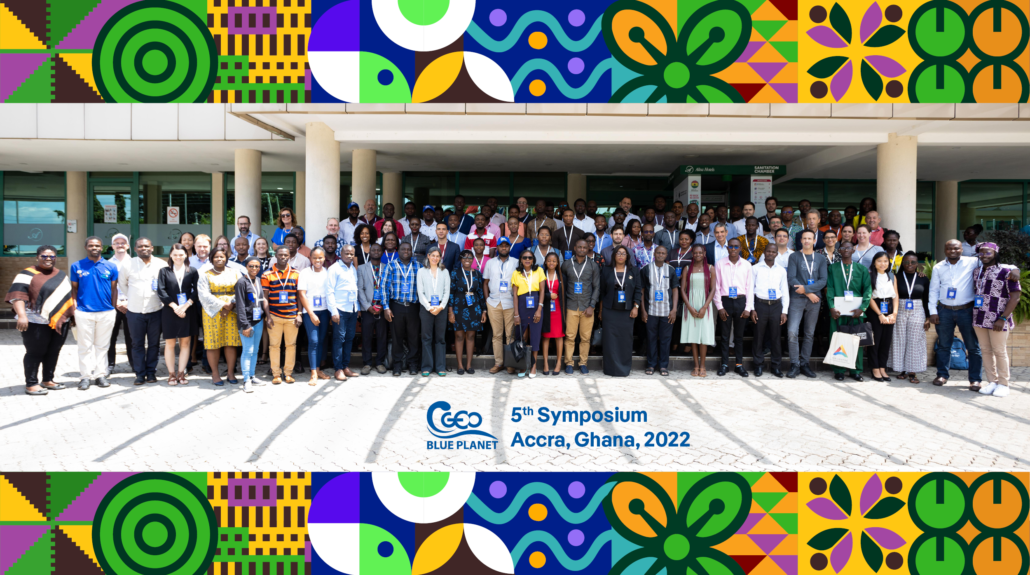GEO Blue Planet held its 5th Symposium between 24 and 28 October 2022. For the first time, this flagship GEO Blue Planet event took place on the African continent, in Accra, Ghana. Themed Local Action in Support of Global Traction, the 5th Symposium was specifically geared towards improving GEO Blue Planet’s engagement with African nations in an effort to expand the Earth Observation community of practice, strengthen local capacity and provide access to resources, tools and services.
The in-person event welcomed 180 participants from 16 different countries, representing diverse sectors, including academia, industry, regional governing agencies, Ghanaian public authorities, Earth Observation experts, NGOs and media.
“We’re excited to be here in Ghana, for the symposium we look forward to making connections with the ocean and coastal researchers of Africa, and local and regional change-makers. We’re hoping the symposium will spark innovative projects to help with the sustainable development of Blue Economy across Africa, and improve conservation of Africa’s resources.” – Dr. Emily Smail, Executive Director of GEO Blue Planet Secretariat, NOAA & University of Maryland
The Symposium featured three plenary sessions focused on the themes of Fisheries, Ecosystem Conservation and Coastal Hazards. These sessions served to explore role of Earth observations in addressing specific regional user needs, tools and opportunities and inspiring examples of using coastal and ocean observations related to each theme.
“Highly polluted inland rivers imply that we are heavily polluting our oceans –hence killing the seas and oceans for the fishing industry – we must take efforts to stop illegal mining, stop pollution of our inland waters, and revitalise our oceans for boosting blue economy of Ghana- if we kill our oceans we are indirectly killing our own survival” – Professor Amos Kabo-Bah Associate Professor, Civil and Environmental Engineering, University of Energy and Natural Resources (UENR), Ghana
Participants took discussions forward and networked during the poster forum, which served to exhibit cutting-edge research and developments, and facilitate information round-table discussions. Meanwhile, a full day of training sessions offered students and other participants the opportunity to dive into different topics from ocean and coastal data visualisation tools to using Earth observations for decision making in the blue economy.
“Mercator Ocean International is delighted to co-organise with the support of the European Commission this first GEO Blue Planet symposium in Africa. Ocean and coastal observations play a major role to ensure a safe, healthy and productive ocean. We look forward to further developing our collaboration with the African marine community to address these challenges.”- Dr. Pierre-Yves Le Traon, Scientific Director, Mercator Ocean International.
A side event on Copernicus Private sector Opportunities featured Ghanaian and European Small and Medium Enterprises (SMEs) who delivered pitches on how their marine sector businesses are using Earth observations. The week-long event ended with two days of thematic workshops aligned with GEO Blue Planet’s current activities on using ocean and coastal data for fisheries and aquaculture site selection, monitoring of coastline changes, marine litter, sargassum inundation events and to inform national adaptation plans.
In support of the UN Decade ECOP programme OceanBRIDGES task team, co-led by GEO Blue Planet, each plenary session included at least one Early Ocean Career Professional (ECOP) speaker and the coastal hazards panel discussion was entirely made up of ECOP panellists.
Recommendations and outcomes from the Symposium were then presented to the wider GEO community at GEO Week 2022, which took place a week later in Accra, between 31 October and 4 November in Accra, welcoming more than 1200 delegates.
Locally hosted by the University of Ghana and University of Energy and Natural Resources, this 5th edition was co-organised by the GEO Blue Planet Secretariat (Mercator Ocean International, NOAA and the University of Maryland) and the Atlantic International Research Centre (AIR Centre). The symposium was funded by the European Union through the EU4OceanObs project, the Copernicus Marine Service and the Framework Partnership Agreement on Copernicus User Uptake.
For the report, full agenda, presentations, replays, photos and more information, click on the button below.

